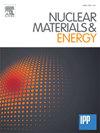H 在 δ-TiH2 中的能量学和动力学: Ab initio 研究
IF 2.3
2区 物理与天体物理
Q1 NUCLEAR SCIENCE & TECHNOLOGY
引用次数: 0
摘要
在存在中子的环境中,钛(Ti)氢化物经常被用作中子慢化剂和结构组件。然而,中子辐照产生的空位对这些材料的使用性能有相当大的影响。为了深入了解潜在的微观机制,我们进行了一项系统的 ab initio 研究,目的是了解氢在δ-TiH2 中的溶解和扩散。研究结果表明,间隙氢原子在能量上有利于占据由四个晶格点氢原子包围的位点,其溶解能为 0.55 eV。从能量上讲,氢原子不利于在 δ-TiH2 的间隙位点聚集。事实证明,空位可以为氢的溶解提供有利的空间。单个钛空位可捕获多达 6 个氢原子,6 个氢原子与一个钛空位的累积结合能达到 1.31 eV。氢的化学势对间隙氢原子之间以及空位与氢原子之间的相互作用有很大影响。最终,利用状态密度和差电荷密度阐明了氢与空位之间相互作用的内在机制。本文章由计算机程序翻译,如有差异,请以英文原文为准。
The energetics and kinetics of H in δ-TiH2: Ab initio study
Titanium (Ti) hydrides are frequently utilized as neutron moderators and structural components in environments where neutrons are present. However, the presence of vacancies, which are created by neutron irradiation, has a considerable impact on the service performance of these materials. In order to gain insight into the underlying micro-mechanisms, a systematic ab initio study was conducted with the aim of understanding the dissolution and diffusion of hydrogen in δ-TiH2. The findings indicate that interstitial hydrogen atoms are energetically favorable to occupy the sites surrounded by four lattice-point hydrogen atoms, with a dissolution energy of 0.55 eV. It is energetically unfavorable for hydrogen atoms to accumulate at interstitial sites in δ-TiH2. It has been demonstrated that vacancies can provide favorable spaces for the dissolution of hydrogen. Single Ti vacancy can trap up to 6 H atoms, and the cumulative binding energy of 6 H atoms with a Ti vacancy reaches 1.31 eV. The chemical potential of hydrogen has considerable influence on the interactions among interstitial H atoms and that between vacancies and hydrogen atoms. Ultimately, the density of states and difference charge density were employed to elucidate the underlying mechanisms that govern the interactions between hydrogen and vacancies.
求助全文
通过发布文献求助,成功后即可免费获取论文全文。
去求助
来源期刊

Nuclear Materials and Energy
Materials Science-Materials Science (miscellaneous)
CiteScore
3.70
自引率
15.40%
发文量
175
审稿时长
20 weeks
期刊介绍:
The open-access journal Nuclear Materials and Energy is devoted to the growing field of research for material application in the production of nuclear energy. Nuclear Materials and Energy publishes original research articles of up to 6 pages in length.
 求助内容:
求助内容: 应助结果提醒方式:
应助结果提醒方式:


